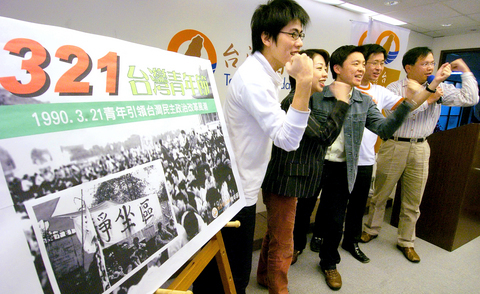The Taiwan Solidarity Union (TSU) yesterday urged the government to change the date of Youth Day from March 29 to March 21, the day in 1990 that former president Lee Teng-hui (
"Youth Day is the day that Chinese revolutionaries initiated a rebellion against the Qing Dynasty in 1911, before the Republic of China (ROC) was built," TSU's director of the Department of Youth Development Wang I-chou (王義州) said in a news conference held yesterday afternoon at the TSU's headquarters. "However, the ROC doesn't exist anymore for young people living in Taiwan. The origin of this red-letter day has nothing to do with them. We think it makes no sense that the central government still holds services to pay homage to Chinese revolutionaries."
In 1954, the Chinese Nationalist Party (KMT) government set March 29 as the nation's Youth Day to commemorate the "72 Martyrs" who died in an unsuccessful revolt against the Qing Dynasty launched in Guangzhou in 1911.

PHOTO: WANG MIN-WEI, TAIPEI TIMES
Wang said that the TSU will ask its legislative caucus to propose a motion to change Youth Day from March 29 to March 21, a significant day that triggered a series of political reforms.
In March 1990, over 300,000 college students launched a sit-in demonstration at CKS Memorial Hall to ask for direct election of the president and vice president and an over-all re-election of National Assembly representatives. On March 21, Lee, then president, received the student representatives in the Presidential Office and reacted positively to their demands.
"Taiwanese young people created history with their actions and ignited the reform on March 21," Wang said. "We think that day should be set as Taiwan's Youth Day."
Chao Tien-lin (
Meanwhile, TSU Secretary-General Chen Chien-ming (陳建銘) said yesterday that the party has issued an order asking all TSU members to help mobilize at least 100,000 people to join in Saturday's march. Chen said that Lee will give a speech on that day but might not join in the parade because of security concerns.

‘DENIAL DEFENSE’: The US would increase its military presence with uncrewed ships, and submarines, while boosting defense in the Indo-Pacific, a Pete Hegseth memo said The US is reorienting its military strategy to focus primarily on deterring a potential Chinese invasion of Taiwan, a memo signed by US Secretary of Defense Pete Hegseth showed. The memo also called on Taiwan to increase its defense spending. The document, known as the “Interim National Defense Strategic Guidance,” was distributed this month and detailed the national defense plans of US President Donald Trump’s administration, an article in the Washington Post said on Saturday. It outlines how the US can prepare for a potential war with China and defend itself from threats in the “near abroad,” including Greenland and the Panama

The Chinese Nationalist Party (KMT) is maintaining close ties with Beijing, the Democratic Progressive Party (DPP) said yesterday, hours after a new round of Chinese military drills in the Taiwan Strait began. Political parties in a democracy have a responsibility to be loyal to the nation and defend its sovereignty, DPP spokesman Justin Wu (吳崢) told a news conference in Taipei. His comments came hours after Beijing announced via Chinese state media that the Chinese People’s Liberation Army’s Eastern Theater Command was holding large-scale drills simulating a multi-pronged attack on Taiwan. Contrary to the KMT’s claims that it is staunchly anti-communist, KMT Deputy

RESPONSE: The government would investigate incidents of Taiwanese entertainers in China promoting CCP propaganda online in contravention of the law, the source said Taiwanese entertainers living in China who are found to have contravened cross-strait regulations or collaborated with the Chinese Communist Party (CCP) could be subject to fines, a source said on Sunday. Several Taiwanese entertainers have posted on the social media platform Sina Weibo saying that Taiwan “must be returned” to China, and sharing news articles from Chinese state media. In response, the Mainland Affairs Council (MAC) has asked the Ministry of Culture to investigate whether the entertainers had contravened any laws, and asked for them to be questioned upon their return to Taiwan, an official familiar with the matter said. To curb repeated

Myanmar has turned down an offer of assistance from Taiwanese search-and-rescue teams after a magnitude 7.7 earthquake struck the nation on Friday last week, saying other international aid is sufficient, the National Fire Agency said yesterday. More than 1,700 have been killed and 3,400 injured in the quake that struck near the central Myanmar city of Mandalay early on Friday afternoon, followed minutes later by a magnitude 6.7 aftershock. Worldwide, 13 international search-and-rescue teams have been deployed, with another 13 teams mobilizing, the agency said. Taiwan’s search-and-rescue teams were on standby, but have since been told to stand down, as